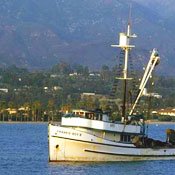Mississippi's oyster fishermen, already hit earlier in the year with scares of infected seafood, greeted a stormy last day of the commercial season, along with possibilities of being unable to sell the day's catch.
"Winds are high," reported Jackson Free Press news editor Lacey McLaughlin, who went out this morning on a commercial oyster boat from Bay St. Louis. McLaughlin's observation confirms reports that the weather on the Gulf will provide less-than-ideal conditions to ward off the oil slick making steady progress to coastal beaches. The now 2,100-square-mile slick is the result of the April 20 explosion and subsequent sinking of the BP oil platform, Deepwater Horizon, in the Gulf of Mexico.
"It's been a rough season" for the oystermen, McLaughin added, and today's confusion about whether they would be able to sell what they pulled in today hasn't helped. There was talk about not being able to sell today's catch because of the advancing oil, but it turned out not to be a problem, she said. Yet.
Other fishing industries may fare much worse. May is traditionally the beginning of the Gulf shrimp season, valued at more than $440 million in 2008. BP and the shrimp industry have taken steps to protect the shrimp stock, but its future is unclear at this time. In total, the nation gets about 20 percent of its seafood from the Gulf, all of which is endangered by the oil.
The men and women employed in Mississippi's fishing industry are already talking about the possibility of job opportunities to assist in spill cleanup, McLaughlin said. Crews were on the water early this morning putting booms out to protect Bay St. Louis, one of the many Mississippi coastal towns that are managing to emerge from the devastation of Hurricane Katrina in August 2005. This newest threat—man-made this time—could be more devastating than that of the 1989 Exxon Valdez disaster that virtually destroyed the ecology and industry of the Prince William Sound in Alaska.
Florida Gov. Charlie Crist this morning declared a state of emergency for the state's panhandle coastal counties. On the list of counties the governor expects to see affected are Escambia, Santa Rosa, Okaloosa, Walton, Bay and Gulf.
Louisiana Gov. Bobby Jindal has also taken steps to assist his state in what environmentalists fear will be one of the largest environmental disasters on record. This morning, Jindal asked U.S. Department of Commerce Secretary Gary Locke to declare a commercial fisheries failure in Louisiana, in addition to asking Small Business Administrator Karen Mills to activate its disaster clauses that will enable the SBA to come to the aid of businesses affected by the spill.
Watch for McLaughlin's updates to this story on jacksonfreepress.com, and follow her on Twitter @jxnfreepress.



Comments
Use the comment form below to begin a discussion about this content.